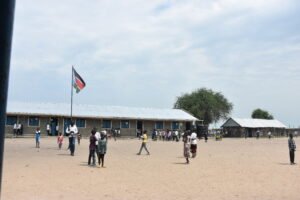South Sudan is largely a patriarchal society. Women are largely confined to domestic chores and caring after children. Resultantly, their economic position is so feeble, making them more vulnerable and susceptible to dominance by their male counterparts.
The women in Melut County of Central Upper Nile are an exception. Even though the women try to practice economic activities such as small-scale crop production, most productive resources remain under the control of their husbands. The women also lack the capital to venture into any meaningful economic activity, let alone lack financial management skills, which is also a major challenge that often hinders their progress as entrepreneurs.

Schoolchildren in Upper Nile playing during break time
The unrelenting years of flooding and conflicts have further exacerbated the economic situation and decimated the livelihoods of many households. Amongst these is 37–year–old Acher Aguek, who previously faced many challenges, and she had this today, “We were really suffering. Most women were jobless. Most of us wanted to start a business, but there was no start-up capital.”, recalls Aguek.
Luckily for Aguek and others, World Vision, through the USAID/BHA funded Accelerating Recovery and Resilience in South Sudan, facilitated the formation of a Village Savings and Loans Associations (VSLAs) locally known as “Sanduk.” The project aimed to boost the local communities’ economic capability by forming Village Saving and Loans Associations.
Aguek is a member of a 15-member Melut Payam VSLA group. World Vision also provided the VSLA group with start-up kits, a saving box, a record book calculator, and passbooks. The group members were also trained in group dynamics, literacy, numeracy, and financial management. The group meets once a week every Wednesday, and each member contributes 1,000 South Sudanese Pounds (an equivalent to $9). To raise cash for saving, the VSLA members collect firewood to sell, others vend water, others sell tea, and some work in restaurants. The contributed money is kept in a metallic box called “Sanduk,” which is locked with three padlocks whose keys are separately kept by three people. The locks are only opened when all these three people are available and during the meeting days. These three people are the treasurer, secretary, and chairperson. So far, since December 2022, the group has saved cumulatively 450,000 SSP (an equivalent 447.3$).
The group decided not to open the “Sanduk,” and agreed that the savings would not be distributed to all members and rather have it grow. The members decided to continue saving until such a time when the cash grows and is reasonable enough to invest into a business. These savings have greatly enhanced the livelihoods of the members and enabled them to meet some of their family expenses and basic needs.
“I was able to access a loan from the savings group, and I managed to buy my children shoes, clothes, and food and other household items.”, says Aguek
As the group nears its closure, management envisages the group carrying forward the realized achievements, as stated by Erickson Bisetsa, the ACCESS Chief of Party. This is something the women groups and all other groups would wish for. “We hope that they will sustain the gains the results the project has achieved in collaboration with them, and we pray that God will continue to provide peace in South Sudan. So that all the partners work towards strengthening household resilience and allowing South Sudanese to provide well for their children without any external support.”, states Bisetsa.
He said the donor allowed World Vision to continue providing humanitarian assistance to these communities in Upper Nile because of the fragile context. “So many man-made and natural disasters, so we have received 2.5 million USD to allow continuity of humanitarian services to these communities beyond December 2023.” Said Bisetsa.


